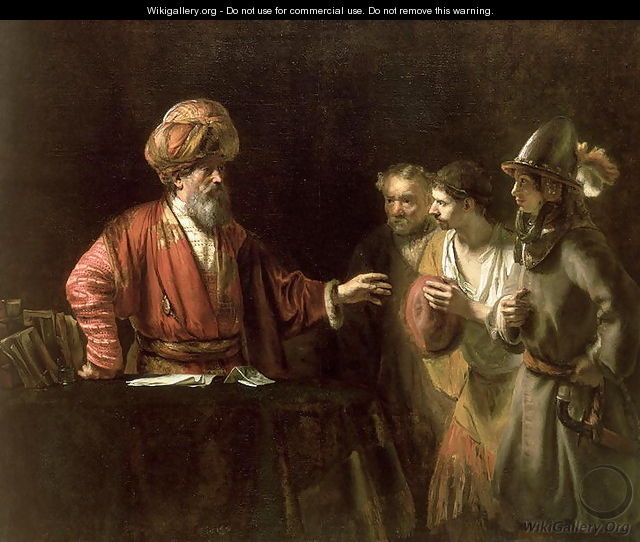For this reason the kingdom of heaven may be compared to a king who wished to settle accounts with his slaves. When he began the reckoning, one who owed him ten thousand talents was brought to him; and, as he could not pay, his lord ordered him to be sold, together with his wife and children and all his possessions, and payment to be made. So the slave fell on his knees before him, saying, “Have patience with me, and I will pay you everything.” And out of pity for him, the lord of that slave released him and forgave him the debt. [Matthew 18: 23-27, NRSV]
[L] The Unmerciful Servant by Willem Drost, ca. 1655. [M] The Unforgiving Servant by Domenico Fetti, c.1620. [R] The Unmerciful Servant by John Everett Millais, 1864.
Pope Francis opened the Jubilee of Mercy, an extraordinary holy year, on Dec. 8, the Solemnity of the Immaculate Conception. The Holy Year will close Nov. 20, 2016, with the Solemnity of Christ the King.
The following day, Pope Francis dedicated his general audience remarks to answering the question of why he called for a jubilee on the subject, saying the primary reason is simply because the Church needs this extraordinary moment.
The jubilee, he said, “is an ideal time for all of us, because in contemplating Divine Mercy, which overcomes every human limit and sheds light on the darkness of sin, we can become more convincing and effective witnesses.”
Then, the Holy Father said something that has the potential of detaining us in engaging meditation each time we think of divine mercy. Mercy, he said, is what pleases God most.
Every time we think about this statement by the Holy Father, the rather comical story the Lord told in the Parable of the Unforgiving Servant flashes across the mind. In Matthew 18:21-35, we learn that out of mercy, the king forgave a slave a great sum of money that the slave owed him. The figure quoted was ten thousand talents. One talent is equivalent to 6,000 denarii. At a wage of one denarii a day, it would take a slave 6,000 days or 16 years to earn one talent. He would need to work 160,000 years to earn the money to pay this huge debt. The message is clear, the debt was so huge that the slave really had no way of repaying it. As a result, it was a huge burden, something that hung over his head and enslaved him in his twenty-four hour day. In a word, the slave was existing in a human condition that was nothing other than death-bound.
In forgiving the slave this irreparable debt at the slave’s plea, therefore, the king thereby set the slave free to live a glorious life liberated from the choking burden of debt.
It is only right to imagine that this incredibly generous and merciful king would wish to see that this “blessed” slave would remember the mercy done to him. If he could remember (that’s memoria we are talking about), he would be grateful for it and thus hopefully go on to live a life of thanksgiving (in other words, memoria could then lead to eucharistia). Remembering mercy, the slave might in turn do mercy to others who needed forgiveness and mercy.
And yet, in the very next moment, this slave, his memory of the king’s mercy on him promptly forgotten, turned on a poor fellow slave who was unable to pay him one hundred denarii that the fellow slave owed him. Forgetful of mercy, this slave was unable to do mercy at all.
The Gospel’s detailed description of the action of this unforgiving servant is rather comical. Matthew says even though his fellow slave fell on his knees and pleaded for mercy, the unforgiving and merciless slave seized him by the throat and demanded payment and, failing to get it, threw the fellow slave into prison. Imagine, he seized the other man by the throat for just a hundred denarii after he himself had been forgiven the colossal sum of ten thousand talents. To heighten the impression of this wicked slave, the translation of verse 28b in the Jerusalem Bible from which we take the liturgical reading is even more comical. It says: “he seized him by the throat and began to throttle him”. He throttled him, the translation says. The only other place one would normally find the use of “throttle” is where a pilot flies an aircraft, and he applies full throttle for take-off.
When the matter was brought to the knowledge of the king, he at once had that wicked slave sentenced to torture – which of course suggests the absence of salvation and a life of torture in hell fire instead.
So clearly, just as “mercy is what pleases God most” as Pope Francis says, an unforgiving attitude and an unmerciful heart is what God detests most.
Equally clearly, this scripture is written for the instructions of Christ’s disciples on three counts:
- Firstly, as the people of God, we must remain ever conscious that we are forgiven sinners always in need of God. Unless we realize that we are sinners, we will not live like humans in need of God and Christ who heal and forgive sins.
- Secondly, as disciples we constantly speak of forgiveness and mercy as what God and Christ do and as what God and Christ require of us. But unless we ourselves truly practise forgiveness and mercy, how dare we go round preaching to the rest of humanity to do the same?
- Then, thirdly, as a community of Christian disciples, in all that we teach and do, are we setting God free for humanity and humanity free for God? Are we promoting doctrines, rules and liturgical regulations in such a way that we disallow God to be present and available to certain people? Are we enforcing laws and regulations in such a way that we are in reality holding people back from approaching God?
It is as we reflected in this way, that we could make sense of the strong language used by the respectable Austrian Cardinal Christoph Schönborn. Speaking at the gathering in Rome of the World Apostolic Congress on Mercy at the end of March this year, he spoke against the hardening of the heart by clergy and political leaders.
Schönborn, a Dominican friar who leads the Vienna archdiocese, said the way that mercy sometimes encounters a hardening of the heart is an enigma that was faced by Jesus, even from his closest followers.
And so the cardinal made a few remarks which we deem important to reproduce here. He said:
- “We have to be frank that even the disciples of Jesus suffered a hardening of heart and Jesus often had to ask them why their hearts were so hard.”
- “The callousness of the disciples with Jesus is probably the most terrible suffering for Jesus. Not the hardening of the hearts of enemies, but the hardening of the hearts of the disciples.”
- “Why do you not understand?” the cardinal asked, just like Jesus would ask.
- “Why do we so many times have hard hearts between ourselves, mad at our communities?”
- And then, quoting the 14th-century St. Catherine of Siena, he observed that where mercy is lacking and hearts get hardened: “Priests can become wolves and cardinals devils this way!”
Now, that last bit is really shocking – priests and bishops becoming wolves and devils! That recalls what Erasmus of Rotterdam of the late 15th and early 16th century once wrote: Man to man is either a god or a wolf.
In conclusion, three things on mercy challenge our attention. First, mercy is what pleases God the most. Second, however, the people of God, even from the ranks of the ordained, can have hearts that are hardened against mercy. And third, once our hearts are hardened against mercy, we can become like devils and wolves to each other and to the people, instead of behaving like true disciples of Christ we announce to the world that we are.
And so we are back to Pope Francis’ point: in this Mercy Jubilee Year, God calls all in the Church to a conversion of heart. The holy door is no auto-dispenser of indulgences. Rather, as we go through the holy door, “we must also open wide the doors of our heart,” the Holy Father urges, suggesting that people can even stand before the holy door and ask: “Lord, help me to open the doors of my heart.” The holy door is open in vain to us whose doors to the heart are shut tight to God and others.
Copyright © Dr. Jeffrey & Angie Goh, June 2016. All rights reserved.
You are most welcome to respond to this post. Email your comments to jeffangiegoh@gmail.com. You can also be dialogue partners in this Ephphatha Coffee-Corner Ministry by sending us questions for discussion.



